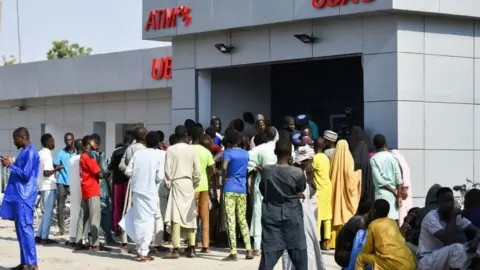Nigeria's naira crisis: Supreme Court suspends banknote deadline
 Getty Images
Getty ImagesNigeria's Supreme Court has temporarily suspended Friday's deadline to stop using old banknotes, which had caused a cash crisis in the country.
Banks have not been releasing enough of the new naira notes, leading to desperate and chaotic scenes as people tried to get their hands on them.
There were fights at ATMs, protests and mob attacks on commercial banks.
The chaos led to concern that it could affect this month's elections, as many Nigerians do not have bank accounts.
The head of the election commission said some election service providers will need to be paid in cash, and that could prove to be difficult.
A spokesperson for the presidential campaign of Bola Tinubu, running for the ruling APC, welcomed the Supreme Court ruling. "Our people have suffered greatly due to the incompetence of officials," said Ajuri Ngelale.
Mr Ngelale added that the purpose behind the policy was "laudable" but that the lack of cash caused "rightful frustration" resulting in "civil unrest".
Mr Tinubu had alleged that powerful forces were intentionally making cash scarce in order to thwart his chances of victory.
Atiku Abubakar of the main opposition PDP backed the policy in principle but said it had been implemented poorly.
While Peter Obi of the Labour Party urged Nigerians to be patient, saying the reforms would have long-term benefits.
Some observers have pointed out that the lack of access to cash might make it more difficult for candidates to bribe voters - which is a common practice in the country.
There was relief in Lagos at the Supreme Court's decision.
"It's the best move. It'll make things easier for us. They need to release all the old and new naira notes, because the pressure is too much," 39-year-old Saka Akin told the BBC.
However, while the ruling removes the pressure of Friday's deadline, it may not immediately help those struggling to get their hands on cash.
Paul Alaje, an economist at SPM Professionals, told the BBC that the decision would only benefit wealthier people: "[It is] good news for the elite who can now spend the old notes they've been hoarding."
Mr Alaje added that only 20% of the old notes remain in circulation, while many people in rural areas will not even be aware of the judgement so will continue avoiding the old notes.
This was backed up by Lagos resident Rosemary, 22: "It's annoying. We've not even seen the new notes. I have 7,000 naira on me now," she said. "What do I do if people still don't want collect it from me? We should just keep using the old ones."
Why were the new notes introduced?
The Central Bank said the currency redesign and replacement policy, which was announced in October, would help it tackle inflation, which is currently running at about 21%, by reducing the amount of cash in circulation. It added that 80% of the notes currently in circulation were being held outside financial institutions.
It said that the new notes would be harder to forge and also said it would limit the amount of withdrawals in order to promote a cashless society.
The deadline to stop using the old naira notes was initially 31 January but this was extended until 10 February to give the banks more time to roll out the new notes.
The Supreme Court decision comes after a legal challenge initiated by the APC-run northern states of Kaduna, Kogi and Zamfara earlier this month.
Their lawyers argued that the government's policy had led to an "excruciating situation that is almost leading to anarchy in the land".
The case has been adjourned to 15 February.
What went wrong?
It was initially thought the cash shortage was because the banking authorities had not released enough new notes.
However, the country's anti-fraud agency, the Economic and Financial Crimes Commission (EFCC), recently shared information about raids in which officers had arrested bank managers for allegedly hoarding the new notes in vaults rather than putting them in ATMs and giving them to customers.
Last week APC governors met President Buhari and urged him to rethink the policy. However, Mr Buhari reiterated the deadline, vowing that the government would do "everything" to resolve the issues.
It is estimated that around 40% of Nigeria's adult population does not have a bank account - especially those living in rural areas.

- VIEW FROM RIVERS STATE: The oil land with no electricity
- PRESIDENTIAL CANDIDATES: The allegations against the top contenders
- DISINFORMATION: The influencers paid to manipulate your vote
- BASIC GUIDE: What you need to know about Nigeria's elections
- FULL COVERAGE: Nigeria Elections 2023

